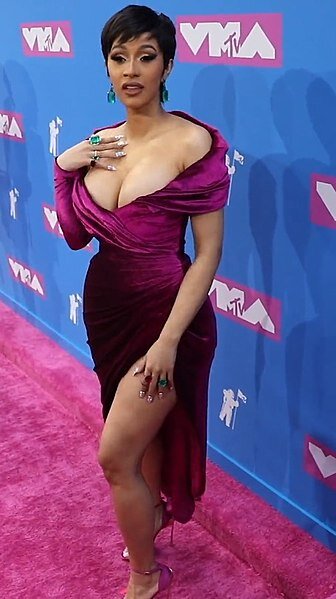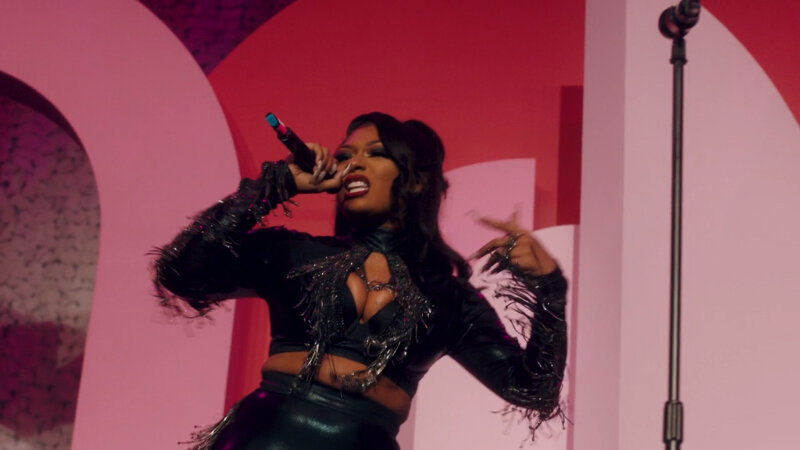Megan Jovon Ruth Pete, professionally known as Megan Thee Stallion, released her latest single, “HISS,” on Jan. 26, sending the internet into a frenzy, especially on X, formerly known as Twitter. Minutes after its release, stans and casual listeners alike were in shock over Megans’ diss track, especially regarding its references to Onika Tanya Maraj-Petty, also known as Nicki Minaj.
SNL Is ‘Live From New York’ Again
Image courtesy of Flickr
By Kenna Hurtuk ’23
Staff Writer
Season 46 of “Saturday Night Live” kicked off on Oct. 3 with unique guidelines and protocols in place for its cast members, crew and audience. Yes, audience — a select number of viewers, with a limited ticket selection for the general public as well as a special selection for health care workers, donned masks to enter the studio after being rigorously tested for COVID-19 and its symptoms. This is an unprecedented shift from the last several episodes of season 45, which were all aired virtually and filmed from cast members’ homes. Show creator and producer Lorne Michaels defended the decision to include a live audience. “With comedy, when you don’t hear the response, it’s just different. With the kind of comedy we do, which quite often is broad, timing gets thrown off without an audience,” he reflected.
For this episode, timing in general was a major challenge, as just one day before the show went live, President Donald Trump announced that he had tested positive for COVID-19. Writers scrambled to incorporate information surrounding his diagnosis into the cold open which parodied the presidential debate between Trump (played by Alec Baldwin) and Joe Biden (played by Jim Carrey). They ultimately went the ironic route with Carrey as Biden remarking, “Imagine if science and karma could somehow team up to send us all a message about how dangerous this virus can be. I'm not saying I want it to happen, but just imagine it did.”” Later, in host Chris Rock’s monologue, the comedian quipped, “President Trump’s in the hospital from COVID[-19], and I just want to say, my heart goes out to COVID[-19].”
After the show aired, writers were accused of mocking Trump’s diagnosis. Baldwin responded to claims that the jokes were in poor taste. “We only have the words of the White House itself and the people who work there themselves to go on and all of them have been saying he is not in any danger. We only have their word to go by. If their word had been that he was in serious trouble, then we wouldn't have done it,” Baldwin said. Additionally, the (albeit morbid) irony of Trump’s diagnosis would have been difficult to ignore, especially in the context of that week’s debate, in which Trump mocked Biden for wearing masks in public.
Following the cold open, Rock brought both levity and urgency to the nature of presidential elections themselves. “I think we need to renegotiate our relationship to the government,” he explained. “Does it work? I mean, I think Joe Biden should be the last president ever. Like, we need a whole new system.”
He added that “we’ve agreed in the United States that we cannot have kings, yet we have dukes and duchesses running the Senate and the Congress, making decisions for poor people. Rich people making decisions for poor people — that’s like your handsome friend giving you dating advice.” The comedian reminded the audience — both the socially distanced audience present and the millions of viewers watching from home — that “we’ve got to take this serious, man.”
His monologue called into question what the role of comedy should be during this unprecedented time. Can shows like SNL justify the playfulness with which their platform addresses serious structural issues, even in the name of comedy? It is a delicate balance to tread.
Megan Thee Stallion tackled this interplay between entertainment and advocacy in her performance of “Savage.” Midway through the number, she and her dancers raised their fists as the screen behind them shattered and the sound of gunshots rang through the studio. As they stared directly into the audience, an audio clip from Malcolm X’s speech “Who Taught You to Hate Yourself?” began to play, while the screen projected the quote, “The most disrespected, unprotected, neglected person in America is the Black woman.”
When Megan Thee Stallion broke her silence, she said, “We need to protect our Black women and love our Black women, ’cause at the end of the day, we need our Black women. We need to protect our Black men and stand up for our Black men, ’cause at the end of the day, we’re tired of seeing hashtags of our Black men.” She and her dancers ended the song with emphasis on the message that had been projected onto the back wall of the stage: “Protect Black Women.”
Megan Thee Stallion’s appearance enabled her to make a powerful statement while still being able to enjoy her time on set and showcase her lyrical and comedic talents. The rapper and singer-songwriter continued her SNL debut with a performance of “Don’t Stop” featuring Young Thug. Later, she also joined cast members Chris Redd, Kenan Thompson, Pete Davidson and Ego Nwodim in “Bottom of Your Face,” a music video commentary on dating while wearing masks.
Since the first at-home episode of SNL, COVID-19 has been a recurring cast member, and it framed much of the context for this in-person episode. Despite limitations of social distancing, time constraints and the sheer volume of material to be packed into a single episode, this was a show to remember.
Cardi B and Megan Thee Stallion’s Sex-Positive ‘WAP’ Goes Viral
Pictured Above: Cardi B (left) and Megan Thee Stallion (right)
By Sabryna Coppola ’22
A&E Writer
Being in quarantine this summer has brought us some great music (and subsequently some great TikTok dances), and Cardi B and Megan Thee Stallion’s duet “WAP” made a huge splash. The song spent two weeks at No. 1 on the Billboard Hot 100 list and has become an instant hit, breaking 93 million streams in its first week. “WAP” has received tons of support from fans of Cardi B and Megan Thee Stallion, but has also drawn the attention of conservative public figures weighing in with their opinions.
The song itself is a sexy, boisterous anthem, celebrating sexuality for anyone with a “WAP” (wet ass p----). The song opens with a sample from Frank Ski’s song “W----- in This House,” looping throughout the song and setting the tone right away. The lyrics are explicit and detailed, putting euphemisms and double entendres to brilliant use.
The music video is visually striking and iconic in its own right, using water to double down on the message, and other symbols of prowess — like tigers — to denote the fierce attitude and intentions of the performers. The video was choreographed by JaQuel Knight who is also known for his work with Beyoncé.
Personally, I loved the song. I love the message, the honest celebration of women’s sexuality and the bold self-awareness of “WAP.” The song has received a lot of attention on the social media app TikTok, sparking a viral dance choreographed by Brian Esperon for viewers to partake in. TikTok influencers, parents and church groups alike have used the song to record their own rendition of Esperon’s dance, embarrass their kids or make up their own parodies.
However, not everyone had such positive feelings about “WAP.” Most notably, political pundit Ben Shapiro made a video on his YouTube channel dissecting the lyrics and reacting to the song. He read the lyrics in his signature monotone, adding his own commentary, which later would inspire remixes with the song performed in his voice. He mocked the song, implying that the sexual confidence portrayed by Cardi B and Megan Thee Stallion would only lead to further objectification of women, and gave the opinion of his wife, a doctor, who apparently advises people with “WAP” to see a doctor.
This response is rather unsurprising from the likes of Shapiro, but parents and critics have denounced the sex-positive anthem as well. The National Review describes the song as “hoary sexual cliches and deification of lowlifes in a music-video milestone,” demonizing both artists for their pasts and shaming them for their sexual content.
This song does what so many songs have done for men in the past. Singing and rapping about sexual prowess is nothing new for men in the music industry. What makes it a problem in “WAP,” besides the fact that it’s two women singing? American culture embraces the sexuality of men while suppressing the same sex positivity for women. The layer of respectability politics overlaid only proves the point more: Rapping about sexuality is only okay when it’s a man, forget two women of color.
Negative reviews and slut-shaming aside, the song has generally been embraced by audiences around the world. It has already been nominated for MTV’s Song of the Summer award, and its star status doesn’t seem to be subsiding. “WAP” makes it clear it is a song made for female empowerment. Its adoration on TikTok makes its generally positive reception obvious, mirroring the popular use of songs by ppcocaine (or Trap Bunny Bubbles) known for their sexual content and inspiring many viral dances.
The National Review writes, “This wanton spectacle is praised as ‘sex positive’ by college-grad journalists who’ve never known any sexual propriety (or the deliciousness of restraint).” The author seems to miss the point that the song was not created for them, or anyone else, but that it’s a form of self-expression and a celebration of the artists’ bodies. As myself, a “college-grad journalist” — if the shoe fits...




